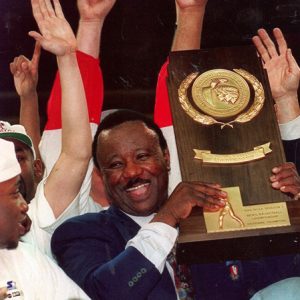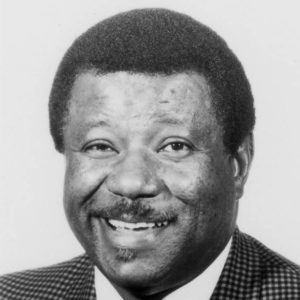calsfoundation@cals.org
Nolan Richardson (1941–)
Nolan Richardson is one of the most famous coaches to have served the University of Arkansas (UA) in Fayetteville (Washington County) Razorbacks basketball program. Richardson won nearly 400 games at UA using his unique style, known as “forty minutes of hell.”
Nolan Richardson was born on December 27, 1941, in El Paso, Texas. He lived only a short distance from Mexico and grew up in a predominantly Mexican El Paso neighborhood. Richardson was three when his mother died, and, as his father was an alcoholic, Richardson was raised by his grandmother.
While playing basketball at Bowie High School, Nolan caught the eye of legendary coach Don Haskins and was recruited to play collegiately at Texas Western College (now the University of Texas–El Paso). He played the forward position from 1960 to 1964. Richardson began his coaching career at Bowie High School, where he first implemented his patented style of play to great success. His “forty minutes of hell” consisted of constant full court pressing and an offense continually pushing the ball up the basketball court. This fast style of play put a lot of pressure on the opposing team.
Richardson moved on to become the head coach at Western Texas Junior College, and his team won the National Junior College Championship in 1980 with a 37–0 record. He took a position with the University of Tulsa in 1981, where his teams won seventy-three percent of their games and compiled a record of 119–37. This placed him second on the Tulsa coaches’ all-time wins list. In addition, his team won the National Invitation Tournament (NIT) championship in the 1980–81 season, and he also took his team to three National Collegiate Athletic Association (NCAA) tournaments. Richardson was inducted into the University of Tulsa Hall of Fame in 2007. At each institution—Bowie High, Western Texas Junior College, and then the University of Tulsa—Richardson broke the color barrier as the first black coach.
When Richardson arrived at UA in 1985, he changed the Razorbacks’ playing style from slow and methodical to a considerably faster game. In his first season, his team went 12–16, but by 1988 he raised Arkansas’s record to 21–9 and earned the team a berth at the NCAA Tournament. In 1989, Richardson began a stretch of three seasons during which his teams went 89–16. Overall, he took the Razorbacks to three Final Four appearances, and one National Championship in 1994 against Duke. He took UA to the finals again in 1995 but lost to the University of California at Los Angeles.
Richardson’s contract with UA was bought out in February 2002 after he spoke out against the administration, saying that UA was unfair in its treatment of African Americans. Later that year, he filed a lawsuit against the university, its board of trustees, and the Razorback Foundation, alleging that they had contributed to a racially polarized working environment. Judge Bill Wilson dismissed the suit in 2004, though testimony during examination bore out Richardson’s allegations, especially with regard to the use of racial and ethnic slurs among board members and administration officials. Even though Richardson left in the midst of controversy, his 389–169 record over seventeen seasons makes him the university’s all-time leader in wins.
In 2005, Richardson coached the Panamanian national team and, in 2007, he began coaching the Mexican national team. He brought his frenetic style of play to the Mexican national team in an attempt to take it to the Olympics, which has not happened since 1976. In 2008, he was inducted into the National Collegiate Basketball Hall of Fame. The following year, he assumed the position of head coach for the Tulsa Shock, a Women’s National Basketball Association (WNBA) team. He resigned from the Tulsa Shock in 2011. That same year, Richardson received the Silas Hunt Legacy Award, given by UA to recognize African Americans for their achievements and contributions. Richardson is a member of the 2014 class inducted into the Naismith Memorial Basketball Hall of Fame, and in 2019 the UA basketball court was named the Noland Richardson Court. On March 16, 2021, the Fayetteville City Council voted unanimously to rename a city street Nolan Richardson Drive. In 2023, he was inducted into the National Junior College Athletic Association Foundation Hall of Fame.
For additional information:
Bradburd, Rus. Forty Minutes of Hell: The Extraordinary Life of Nolan Richardson. New York: Harper Collins, 2010.
Hillie, Bob. “Pride and Prejudice—Arkansas Razorbacks’ Basketball Coach Nolan Richardson.” The Sporting News, March 20, 1995, pp. S16–20.
Katz, Andy. “Richardson Gets a Second Chance with Mexico.” ESPN.com. http://sports.espn.go.com/ncb/columns/story?columnist=katz_andy&id=2979328 (accessed October 5, 2023).
Satter, Linda. “Judge: Richardson Failed to Prove Bias.” Arkansas Democrat-Gazette, July 9, 2004, pp. 1, 11A.
Smith, Kent. “How ‘40 Minutes of Hell’ Became an Iconic Arkansas Basketball Brand.” SI.com. https://www.si.com/college/arkansas/hogs-mens-basketball/razorbacks-nolan-richardson-40-minutes-hell-ncaa-national-champion (accessed October 5, 2023).
Jared Street
Harding University
 Nolan Richardson
Nolan Richardson  Nolan Richardson
Nolan Richardson 




Comments
No comments on this entry yet.